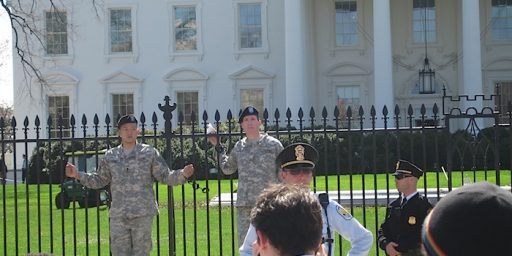The Porn-Election Connection
Via the LAT: Elections sway porn demand
A husband-wife research team has found that voting for the candidate who wins an election makes men more eager to watch pornography, according to a story by Charles Q. Choi atLive Science.
The reason is testosterone.
[…]
The past research showed that after winning a competition, people may have a surge in testosterone, Choi reported. Those who lose would experience a drop in the sex hormone.
I can see the win/loss testosterone factor, I suppose but a) who cooks up the hypothesis that having one’s candidate win leads to increased consumption of “adult materials” and b) how did they test it?
Apparently the answer to “b” is by looking at Google.
The Markeys discovered that after the 2004 presidential election (won by Republican George W. Bush) and the 2008 presidential elections (won by Democrat Obama), porn searches did go up in states that voted for the winning party.
Sounds a bit dubious to me, but apparently the study has garnered publication in Evolution and Human Behavior. Given the lousy track record that journalist have in terms of summarizing scientific studies, I will assume that there is more to the research than the above, but remain a bit skeptical in regards to causality here.






Sounds to me like just another excuse for social scientists to study porn !
This would be funny except for the fact Villanova and Rutgers student are going into debt to pay tuition that helps pay for useless studies like this. The Ivory Tower is rotting away from the inside.
“…useless studies like this.”
Why do you think it is useless? Seems to me to be elucidating the relationship between competitive behavior and emotional states, and hormonal physiology – some insights into how human biochemistry works.
It is really incredible this knee-jerk anti-science, anti-knowledge instinct by so many on the right.
Tano, It’s not knee jerk to be critical of a study that may be interesting to some academics but is pretty much worthless to most of us. Maybe you haven’t noticed but higher education has been experiencing a price bubble to the point where many are asking if college is worth it. When it reaches such a state I believe it’s time to point out where resources are being misapplied and how academic freedom has become academic nonsense in many cases. Would concern for the frail system that some say will collapse have to be labeled ‘anti science’? Is it wrong to look at Academia in pragmatic terms like educating more people for less money? Must all criticism of the academic world be labeled as anti education or ‘anti knowledge’? That’s the knee jerk reaction, the inability to accept criticism. It’s funny too that a couple of generations ago it was the Left doing the criticism.
***It is really incredible this knee-jerk anti-science, anti-knowledge instinct by so many on the right.***
lol, He says this with a strait face while defending a study off why people wack off.
“It’s not knee jerk to be critical of a study that may be interesting to some academics but is pretty much worthless to most of us. ”
Yes it is. It is precisely “knee-jerk” – as in a reflex arc – a reaction to a stimulus that bypasses the brain. In this case, it is your reliance on the notion that a research program need be of value to you specifically, or people in your position, in order to be of value to society as a whole.
Studies are “interesting” to “academics” precisely because they lead to greater understanding of the systems under study – in this case, the human mind and the body’s biochemistry. And that greater understanding is crucial to all manner of future innovations and discoveries that impact the lives of everyone.
It does take a moment’s thought to understand this though. And a moment’s thought can only happen if the stimulus passes through the brain.
“Maybe you haven’t noticed but higher education has been experiencing a price bubble to the point where many are asking if college is worth it”
There have always been people who questioned the value of education. There is a self-selection process at work. Thats the way it is supposed to work..
“..it’s time to point out where resources are being misapplied”
I don’t know the details of the funding for this particular study, but most likely it was funded from federal grant money that is specifically targeted to research of this type – i.e. it does not come out of the budget of the university, and it is not a factor in determining tuition levels.
“how academic freedom has become academic nonsense in many cases.”
Sounds to me like some talking points from the dark side. Do you have any idea what you are talking about?
The whole point of academic freedom is that researchers with proven skills and insights are given the chance to explore the unknown. That necessarily will entail lots of failures, lots of dead ends. Its the process of trial and error. Unfortunately, “error” is an inherent part of trial and error. The only way one ever makes an important discovery is by trying many dead ends along the way.
Then some moronic propagandist comes along and claims that the dead ends, or the less-than-promising outcomes, are examples of “nonsense” – so lets stop the whole scientific enterprise.
“Is it wrong to look at Academia in pragmatic terms like educating more people for less money? ”
Thas an entirely different issue. We are talking about scientific research, not education.
“Must all criticism of the academic world be labeled as anti education or ‘anti knowledge’? ”
No. I only label criticisms “anti-science” or “anti-knowledge” when they betray anti-science or anti-knowledge qualities.
Tano, Your counter to my points leads to an academic world that costs a fortune, yields nothing of value, and has no prestige left. There have to be some controls in place or things will break down. In the past those controls have been in place and served us well. The extreme world of letting academics do whatever pleases them will serve only them. I’m not advocating the opposite extreme but something in the middle. But of course I’m just repeating talking points from the dark side. Isn’t that the way to label any competing views?
S Plunk — So who should be in charge of these controls on research? Clearly not academics, according to you. So who? Knuckle-dragging Bible-thumpers who claim evolution is a conspiracy and baby Jesus? Sarah Palin, who gained an indepth knowledge of half a dozen community colleges while searching for the one with the largest percentage of white students? Or maybe you, who seems to have no clue what science means except that smart people do it, so it must be bad?
Steve,
You simply do not know what you are talking about.
There is no “new” system in place in academia – decisions about research directions are made now the same way that they have been made for decades. Yes, it is, essentially, academics deciding amongst themselves (its called “peer review”) about what will be funded.
This system is perhaps the single most successful thing that America has ever done. Our higher education “academy” is the best in the world. Scientists come from every country in the world to train, study, and research here. Almost all the scientific and technological innovations that exist in the world today have either directly or indirectly emerged from US government sponsored research doled out to tenure track professors by their colleagues.
You seem to have no conception whatsoever of how the system works, so you are not in the position to demarcate what the “extremes” are, let alone the middle.
So from where do you get these ideas that you spout? Obviously not from your own experience. So they must be fed to you by some people. And given that they are as far from the truth as it is possible to be – (“yields nothing of value” – how ridiculous is that?), (“no prestige left” – huh???) and advocating political control of research, it seems rather obvious that they come from the rightwing dark side.
You two can try and defend what has become somewhat indefensible but it still won’t cure what has been ailing our colleges and universities for decades. They need the public’s support but instead the squander what good will is remaining. But hey, go ahead and say I’m getting talking points from someone or that I have no clue about anything. Keep arguing that way rather than address the issue because if that’s all you got it’s all you got.